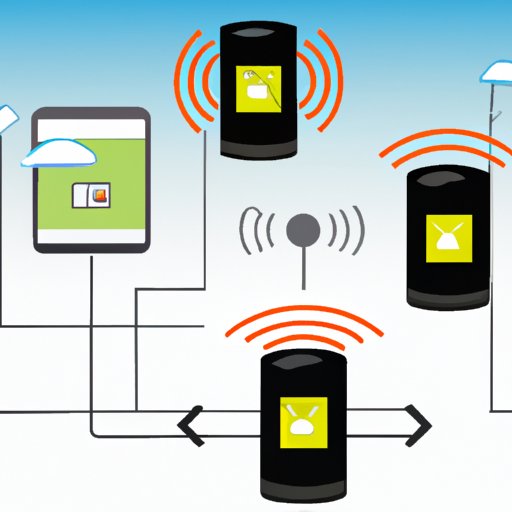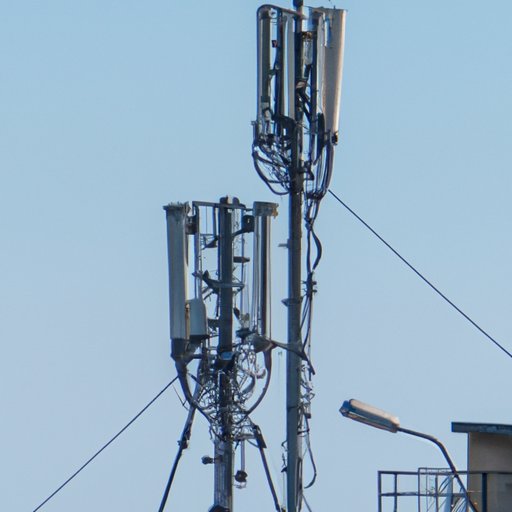Introduction
Cellular data is a type of wireless network technology that allows users to access the internet from their phones. It has become increasingly popular in recent years as more people rely on their mobile devices for communication, entertainment, and work. However, many people don’t understand how cellular data works or how to make the most of it. This article will explore the fundamentals of cellular data and explain how it works for you.
Exploring the Fundamentals of Cellular Data: How Does It Work?
Before diving into how cellular data works, it’s important to understand the basics. Cellular data is transmitted via radio waves, which is a form of electromagnetic energy. The data is sent from your phone to a cell tower, which is then connected to the internet. The speed of this data transfer depends on the type of cellular data you are using, as well as the strength and quality of the signal.
There are two main types of cellular data: 3G and 4G (LTE). 3G is the older, slower type of data, while 4G (LTE) is the newer, faster type. Most modern smartphones support both types of data, although some may be limited to just one or the other. 3G tends to be slower than 4G, but it is still sufficient for most basic tasks such as browsing the web or streaming music.
When data is transmitted, it is broken down into small packets of information. These packets are then sent over the air using radio waves. The strength and quality of the signal will determine how quickly the data is transferred. Poor signal quality can result in slow data speeds or dropped connections.

How Your Phone Uses Cellular Data to Connect to the Internet
Your phone connects to the internet through cellular networks, which are made up of cell towers and antennas. When you turn on your phone’s data connection, it sends out a signal that is picked up by nearby towers. The towers then send the signal to the internet, where it is routed to the appropriate website or service.
The speed at which data is transferred depends on several factors, including the type of data you are using, the strength of the signal, and your phone plan. For example, if you have a 3G plan, you will likely experience slower speeds than if you had a 4G plan. Additionally, if you are in an area with poor signal strength, you may experience slower speeds even if you have a 4G plan.
Your phone plan also affects how much data you can use each month. Most phone plans come with a set amount of data that can be used each month. If you exceed this limit, you may incur additional charges or be throttled down to slower speeds.
The Science Behind Cellular Data: How It Works for You
In order to understand how cellular data works for you, it’s important to understand the science behind it. Cell towers and antennas emit radio waves that carry data from your phone to the internet. These signals are encrypted for security purposes, so that only authorized users can access the data.
Additionally, these signals are amplified by antennas, which are located on top of buildings or other structures. This amplification helps to ensure that the signal remains strong and clear, even when there is a lot of interference. The antennas also help to direct the signal towards its destination, so that it reaches its intended recipient quickly and without disruption.
The benefits of using cellular data are numerous. It is fast, reliable, and secure. Additionally, it is available almost anywhere, so you can stay connected even when you are away from home or the office. Finally, it is relatively inexpensive compared to other forms of internet access, making it an attractive option for those on a budget.
Conclusion
In conclusion, cellular data is a type of wireless network technology that allows users to access the internet from their phones. It is transmitted via radio waves, which are encrypted for security purposes. The speed of this data transfer depends on the type of cellular data you are using, as well as the strength and quality of the signal. Additionally, your phone plan affects how much data you can use each month.
Understanding how cellular data works can help you make the most of your data usage. To optimize your data usage, be sure to choose a plan that meets your needs, and try to avoid areas with weak signal strength. Additionally, take advantage of Wi-Fi whenever possible, as it is typically faster and more reliable than cellular data.
For more information on cellular data, check out the resources below. With the right knowledge, you can make the most out of your data and stay connected on the go.
(Note: Is this article not meeting your expectations? Do you have knowledge or insights to share? Unlock new opportunities and expand your reach by joining our authors team. Click Registration to join us and share your expertise with our readers.)
